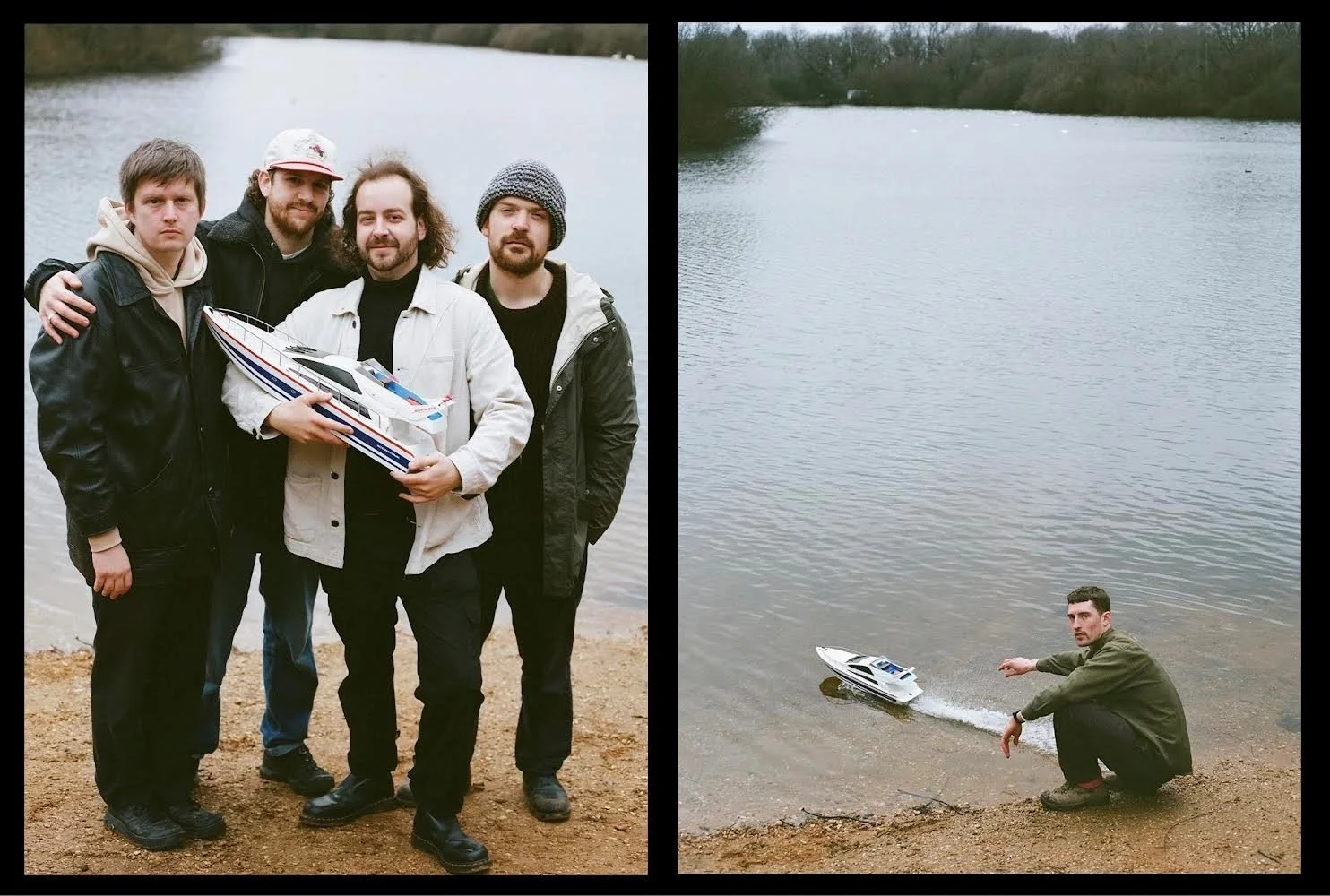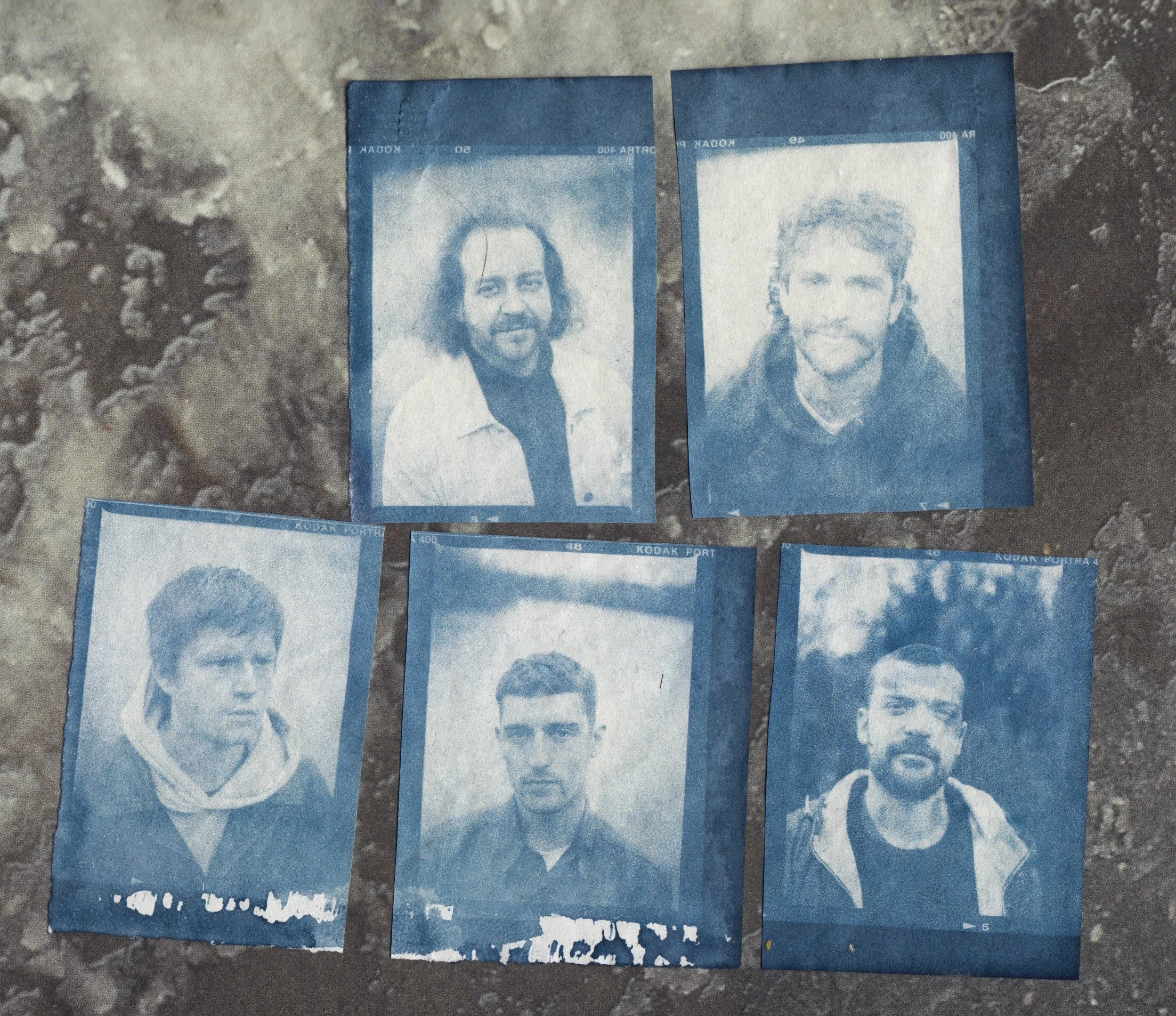Moreish Idols: Is This The Future?
The video for Moreish Idols' debut single, ‘Speedboat’ depicts a cute toy speedboat shooting through various inner-city bodies of water. Zooming through a London pond, emerging from a drainage tube, coughing and spluttering in a deep brown puddle, the video is deceptively basic. The song’s lyrics are the same: A Postman / In Venice / Always on the money / He never misses his stop. But listen to the song, an energetic experiment in post-punk written in 7/8 time signature, and your idea of Moreish Idols will take better shape; they’re undeniably part of a cohort of bands working to develop the sound of alternative music today. When I finally meet singer and guitarist, Jude Lilley, drummer Sol Lamey, and Tom Wilson Kellet, who plays synth, I discover the band to be more closely related to speedboats and the sea, than their fans might realise.
The original members of Moreish Idols met whilst at Falmouth University, in Cornwall. For anyone with friends studying at Falmouth, you will know that many of the nights out and house parties you’d be expected to attend are oriented around the harbour. Walking to-and-from venues, such as the Cornish Bank, or the Killigrew Inn, you can fully expect to see fishermen walking back from a day at sea. Looking out seaward, there’ll be a hundred boats in the harbour at any time, from the biggest cruise ships, trawlers, and yachts, to the smallest ribs, skiffs, and… yeah, speedboats.
That said, Moreish Idol’s connection to Cornwall stops there. They may become the biggest act to emerge out of Cornwall since Fisherman’s Friends, but the sound is anything but folkish. Falmouth has a thriving rock and punk scene comprised of and sustained by university students who make up a third of its population. The band’s influences are more consistent with those of the current students at Falmouth University. This is not to say they are identical.
Part of the reason Moreish Idols can come up with such fascinating experiments in New Wave is due to the band members’ disparate tastes. Bass player, Casper, is more interested in electronic music than Sol, the band’s drummer, whose influences are based in harder, more traditional rock music. It is through experimentation, and negotiation, that the band come up with their songs, as Sol explains.
“We meet in the middle a lot of the time,” he says. “‘Speedboat’ kind of came from our dancey, experimental stage… ‘Speedboat’ came along when we were trying to experiment with time signatures, and trying to do something that was a bit more whacky to us. It was one of the first times we were writing as a full unit. Tom brought in this sick riff, and we were like ‘oh, let’s jam that for a while.’ Then it was pieced together over a period of months. [Speedboat] came about in a period where we were all very busy when we’d just moved to London so we couldn’t fully dedicate a lot of time to writing together. But I think the fast pace of London life is definitely a huge inspiration to the direction ‘Speedboat’ took.”
The place where a band is formed versus where a band choose to live might have a curious effect on the music they start to produce. Consider The Arctic Monkeys, the difference in sound between ‘Whatever People Say I Am, That’s What I’m Not’, composed in Sheffield, and ‘Tranquillity Base Hotel and Casino’, born in L.A. You might even argue, that for a band such as Moreish Idols, the faster pace and pressure of life in London is conducive to their creativity. Being in London, too, lets the band reach a wider audience, with more varied tastes, who will guide the band and usher them toward a sound they recognise as theirs. Though the band have been writing together for a while now, it’s hard to get them to express how precisely they see themselves. When I ask who they might expect to find in their audience: anoraks, pre-teens, goths, Radio 6 Dads, Gen Z-ers, yadda yadda, they can’t seem to decide.
“our music is definitely not in one place. It’s moving around. We’re not sure what is yet, so it does appeal to quite a few different audiences and ages”
This, Tom says, is because “our music is definitely not in one place. It’s moving around. We’re not sure what is yet, so it does appeal to quite a few different audiences and ages. What people say to us after constitutes how we feel about our performance.” Jude joins in. “The last show we did was at the Windmill, and that was just an amazing gig because we were playing with 404 Guild and Vegas Watertaxi, and he killed it, the atmosphere was just amazing, then we played our set and it was pretty much seamless. You can just feel it when it’s a good show. The audience is taking it in. It’s the best feeling ever.”
“That gig Jude’s talking about was quite eye-opening,” Tom adds. “We needed that feeling, where you feel you did a really good job and everyone’s unanimous about it, and I think it’s always when we’re under the most pressure, that we play well. [Playing with 404 Guild] you really don’t want to be shit, and we really weren’t, so. A good gig for us right now is when we’re a little bit scared, and really want to do well.”
Speaking of good gigs necessitates discussing the bad gigs. As our chat continues, it transpires Moreish Idols, for reasons beyond their control, have played enough bad gigs to merit deserving these standout performances. When the conversation moves to the topic of, our worst ever gig, the band actually argue over which show was worse than the other. It turns out a bad gig is as subjective as a good one. “The worst one for me,” Sol says. “Was a little club in Falmouth, just after England got knocked out of the World Cup. Everyone around us was so sad.”
Sad = bad gig. That’s fair enough. Though, I say, at least it wasn’t violent. I’ve heard horror stories of bands playing gigs on the day England lost the Euros descending into chaos. “I played a gig in Falmouth the day after being beaten up. I had this twisted nose. Me and a mate were walking back from a house party when these guys – I think they were way younger than us – started mouthing off. Then my mate said something back and they just saw red and beat the shit out of us. We’re not fighters,” Jude says, shaking his head.
But, let’s rewind. Was Jude beaten up by children? How much younger were they? “I heard the other day that they might have been seventeen or eighteen,” Jude confesses, before remembering an even worse gig. “I remember one gig at Princes Pavilion. We were the headline at this ridiculously massive venue, a grand, unnecessary venue to play, and we played to like five people.” Princes Pavilion is big, 600 capacity. Why were they playing? “This other band wanted us to headline it so they could support. They wanted to get us together with a couple of other random acts. So we all got together, and we reluctantly played it. Then the gig was an absolute nightmare.”
Oh, well. Onwards and upwards. Moreish Idols have been together, in one form or another, for a while now. They are innovative, unbound by genre or unwieldy, grandiose dreams. I want to know what motivates them. Some bands are in it for the fame, others for the recorded artefact and those who bring people together at sold-out stadiums. So, what is it for Moreish Idols, why do they return to the studio to jam every day?
“Speedy [Wunderground] have got a second studio which allows us to write and practice; they have amazing guitars and whatnot, and I can’t express how satisfying it is. That’s one of the biggest drivers for us now, just writing music.”
“Money!” Tom shouts. Sol and Jude start laughing. Tom backtracks. “Uh, we’re not doing very well, if that’s the goal. I think playing gigs is it. We got confused at one point cause we were playing a lot of gigs, but weren’t as prepared as we should have been. But then, the record turned out to be an important part of it. Through lockdown, we got to concentrate on that.” Jude chimes in. “We have been writing an album the last couple of months, and since doing the EP, crafting a body of work has been a huge focus and the most satisfying part. Speedy [Wunderground] have got a second studio which allows us to write and practice; they have amazing guitars and whatnot, and I can’t express how satisfying it is. That’s one of the biggest drivers for us now, just writing music.” To which Tom adds. “Lockdown was a huge saving grace because we were able to write our EP and make it really good, without having any gigs to worry about.”
Once again, this trend emerges. So many of the bands to whom I’ve spoken lately have credited lockdown with allowing them the space for their creativity to flourish. For many, being relieved of certain pressures, such as having to arrive at a nine-to-five job, having the financial relief of furlough payments, plus the generally slower pace, allowed certain ideas that had previously been sidelined space to develop. Moreish Idols are no different. Now lockdown has allowed the band to realise the perfect conditions for songwriting, I ask where they see themselves going. Where do they hope to see themselves in five years? “Oh, hopefully still doing this and, like, we’ve not got shit,” Jude says. “Not skint,” Tom adds. “Rich, and really sexy,” Jude elaborates. “We’ll do what John Lennon and Paul McCartney used to do and be like, ‘let’s write a swimming pool’, we’ll just write songs for money.”
They are joking, obviously. Though they’d rather not be skint. But Jude does see these financial restraints, much like lockdown, as aids to the creative process. “Part of being skint is, surely why music is so good at the moment,” he says. “The music scene is really really pissed off. That’s why it’s so good. That’s why it’s so creative. It’s either angry at the situation, or it’s escapism. And though it’s really annoying, I think it’s birthing quite a few good ideas.”
Maybe this is some consolation we can all take from the economic uncertainty bothering Britain today. Whilst we worry about the inflation of everything from petrol to Maltesers, whilst our government fumble around promising tax cuts to those who don’t need them, then decline pay-rises to key workers, bands like Moreish Idols are writing music. Maybe their music does not actively attack those who are mishandling the economy, or those who protect them, but it does allow us four minutes of our day in which to lose ourselves, to wonder at the new sound we’re hearing and ask, is this the future?



